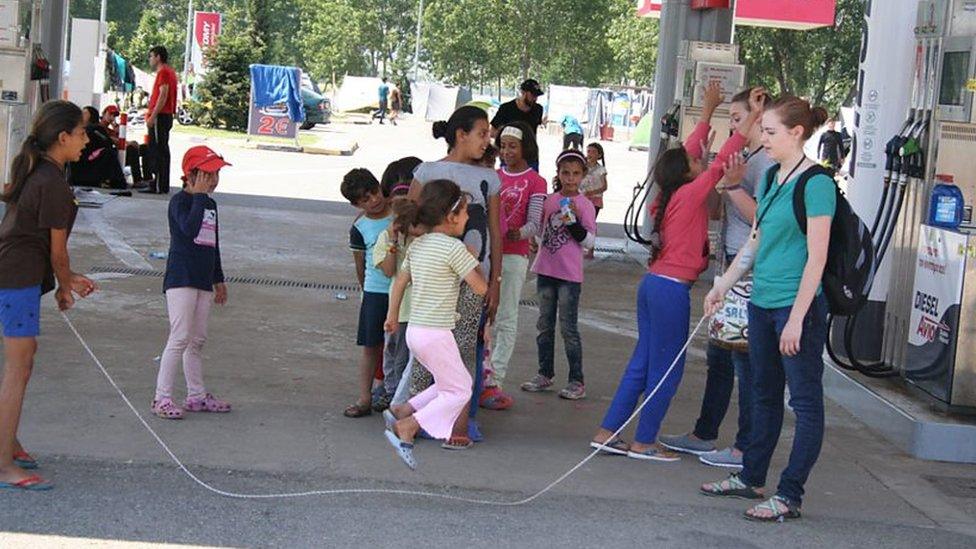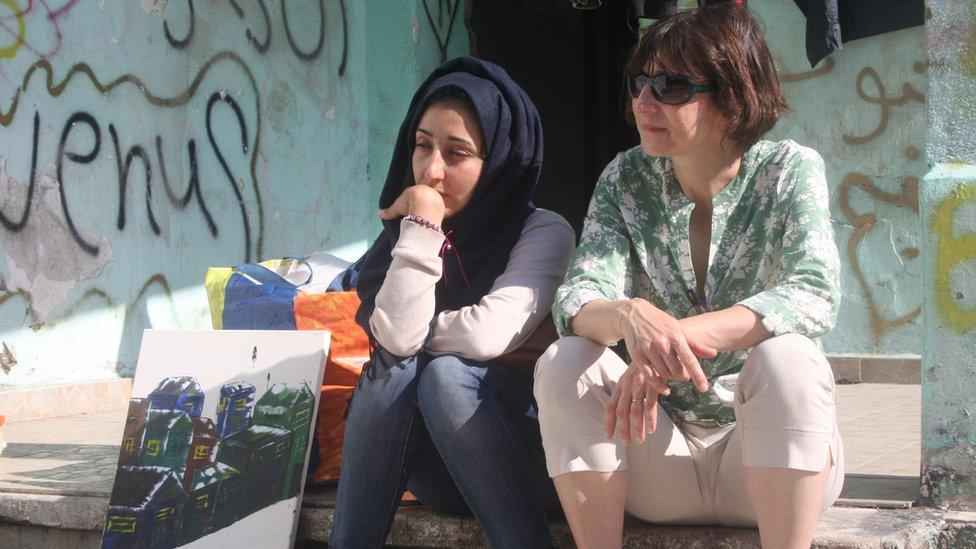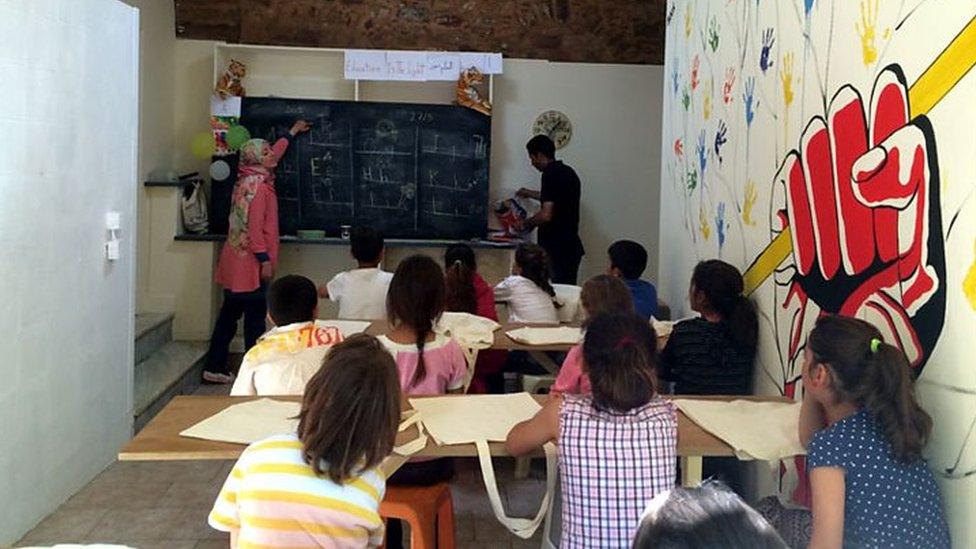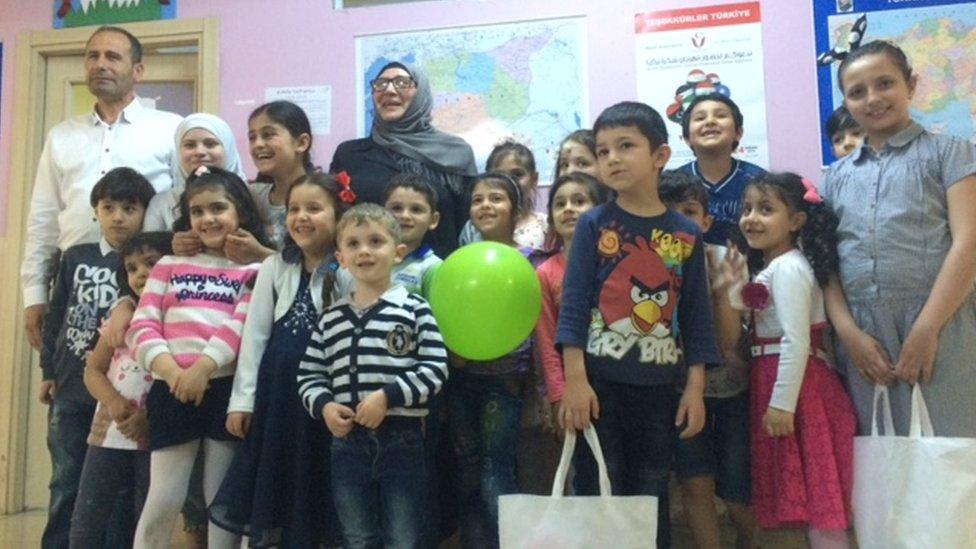Greece's stranded refugees fear being forgotten
- Published

The refugees and migrants have now left the border area with Macedonia and have been moved to camps elsewhere
Since Europe closed its borders to refugees and migrants, nearly 60,000 people have been trapped in Greece.
Waiting many months for asylum interviews, many are desperately seeking a different way out.
The overstretched Greek government is moving people from informal tent cities to official camps, hastily set up in old barracks and empty factories.
Most are bleak and isolated and many lack basic facilities, while the small charities and independent volunteers who made life in the old camps tolerable are generally excluded.
The EKO petrol station near the Macedonian border looks perfectly ordinary now, but less than a month ago it was home to 2,000 people.

A young Syrian refugee talks to Maria Margaronis
Children played skipping games in a forecourt crowded with tents, a burger stand served falafel while a volunteer doctor from Birmingham treated war wounds and everyday ailments and toddlers learned the alphabet by the working petrol pumps.
Among those who came to fill up was a Greek taxi driver, who stopped off to visit a Syrian family he had befriended, and a man in a black Mercedes. "Probably a smuggler," observed a Catalan nurse. "They come through every day."
The government hopes that by controlling entry to the official camps, it will shut out the smugglers. But, as the borders stay closed and conditions in Greece remain dire, their trade continues to grow.

Grim conditions and crime on Chios
It is harder to leave illegally from the Aegean islands, where 8,400 people wait to learn if they can seek asylum in Europe or must be returned to Turkey under the EU-Turkey agreement of 20 March.
The village of Halkeios (population 600) on the island of Chios had few foreign visitors, until recently.
Halkeios is up in the hills near the disused Vial aluminium plant, now a camp run by the Greek authorities for more than 1,000 people consisting of families, single men and unaccompanied minors all living together.
Maria Maragonis talks to farmers in Halkeios
Conditions in Vial are grim. There have been fights, attempted suicides and at least one rape. One of the few distractions is a stroll through the fields to the village, but even doing this has caused issues for local people.
Farmer Kyria Nafsika stands behind her locked gate. A few weeks ago, she led a tractor blockade of the road up to Vial to stop more accommodation containers from being delivered.
"I've been ruined," she says. "They've stolen everything I planted. Europe has to open the borders. These people are suffering here, and we're suffering with them."
Down the road, however, former policeman Kyrios Marinos is more sympathetic.
'I feel sorry for the children'
"My grandfather came from Turkey in the population exchange of 1922," he says. "Lots of us here come from refugee families. The Greeks didn't welcome them, they saw them as Turks. The Syrians helped us then, and now it's our turn."
His wife, Foteini, brings out a Chian delicacy of lemon flowers in syrup. She gives the refugees as much as she can, she says, especially the children, but then more turn up at her door.
"That woman, Merkel, she invited them, she took the ones with money, then she said no more. What can Greece do? We were hungry, and then even hungrier people came. In the end, we'll eat each other," she says.

Educating the children
In the main town of Chios, two more camps are fed and supported entirely by volunteers and non-governmental organisations (NGOs). Most of the effort has to go into meeting basic needs - food, clothing, medical care and information - but hope is also in dangerously short supply.
Two young volunteers have opened an informal school for the many children here, in a former restaurant. The first thing they learned was how to walk in a crocodile, calling out "Good morning" in Greek to everyone they pass.

Some of the migrant and refugee children on Chios have gone without education for months
Nick Millet, one of the founders, says the aim was to bring structure into the children's lives, as some of them have not been to school for more than a year.
They are being taught by four primary school teachers from Syria, who are also empowered by the project.
A bright mural in the yard proclaims: "No-one is illegal," and, in the classroom, children chant the alphabet.
The elderly man next door is smiling. "They've fixed it up very well," he says. "That place was a mess before."
Maria Margaronis's report is episode two of the five-part Destination Europe series broadcast weekly as part of The Compass strand on the BBC World Service
You can listen to the programme on iPlayer.
- Published30 June 2016
